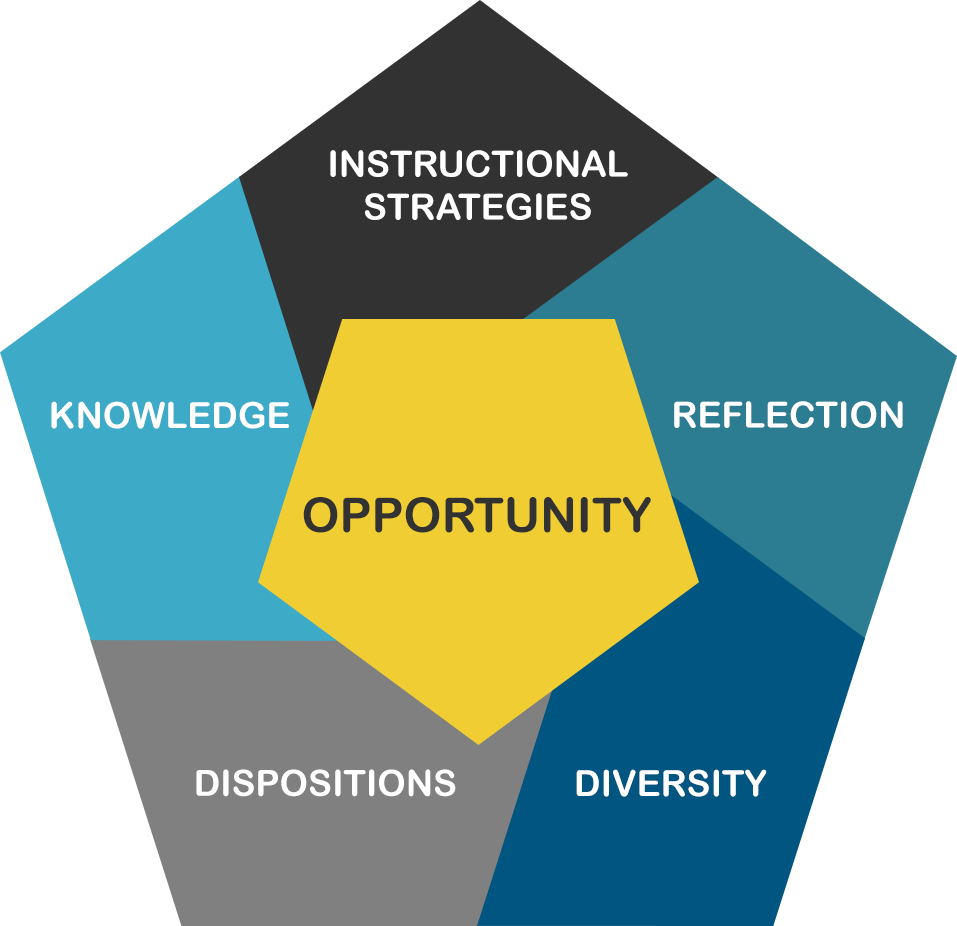Opportunity is the key theme of the Conceptual Framework of the College of Education. It emphasizes the empowering and transformative role education plays in the lives of individuals and entire communities. The College of Education seeks to prepare reflective educators who are dedicated to teaching and learning, who have an understanding and appreciation of the synthesis of theory and practice, who recognize the value and importance of collaboration and mentoring, and who possess and demonstrate proper ethical and professional dispositions. The ultimate outcome is to prepare educators able to recognize the educational needs of their times and able to respond to them in a meaningful way.
The Conceptual Framework of the College of Education’s is based upon 5 dimensions:

Knowledge
Knowledge is the assimilation and accommodation of the various areas of study in becoming a teacher and an educated person. To achieve a depth of understanding requires the application of thinking processes such as scientific thinking, critical thinking, creative thinking and other forms of reasoning.
Reflection
Reflection is an integral part of an academic and professional growth. Being a reflective thinker implies a willingness to review, reexamine, evaluate and rethink educational concepts, processes, and practices.
Dispositions
Academic and professional attitudes, values, and beliefs are demonstrated through both verbal and non-verbal behaviors as educators interact with students, families, and colleagues. In addition to assessing content knowledge and pedagogical skills of pre-service teachers, the CoE identifies, evaluates, and develops students’ attitudinal behaviors, or dispositions.
Diversity
The CoE recognizes the importance of designing and implementing curricula that support students’ appreciation of social justice, awareness and acceptance of differences among people based on ethnicity, race, socioeconomic status, gender, exceptionalities, language, religion, sexual orientation, and geographical area.
Instructional Strategies
Instructional strategies emphasized in the College of Education reflect the current art and science of pedagogy. CoE faculty employ research-based and data-informed practices in varied classroom settings and with diverse student populations. They are intended to facilitate students’ progress and educational success.
References
Bourdieu, Pierre (1986). The Forms of capital. NY: Greenwood.
Dean, Ceri B. (2012). Classroom instruction that works. Alexandria, VA: ASCD.
Dewey, John (1916). Democracy and education. NY: Macmillan.
Freire, Paulo (1970). Pedagogy of the oppressed. NY: Continuum.
Fullan, Michael; Hargreaves, Andy (2012). Professional capital. NY: Teachers College.
Goodman, Diane (2013). Cultural competency for social justice.
Gorski, Paul (2013). Reaching and teaching students in poverty: Strategies for erasing the opportunity gap. NY: Teachers College Press.
11 Maine’s Common Core Teaching Standards (2014). Maine Department of Education.
Marzano, Robert (1997). Dimensions of Learning. Alexandria, VA: ASCD.
Tomlinson, Carroll A. (2014). The Differentiated classroom: Responding to the needs of all learners. Alexandria, VA: ASCD.
Vygotsky, Lev (2012). Thought and language. Cambridge, MA: MIT.
Wiggins, Grant; McTighe, Jay (2005). Understanding by design. Alexandria, VA: ASCD.
